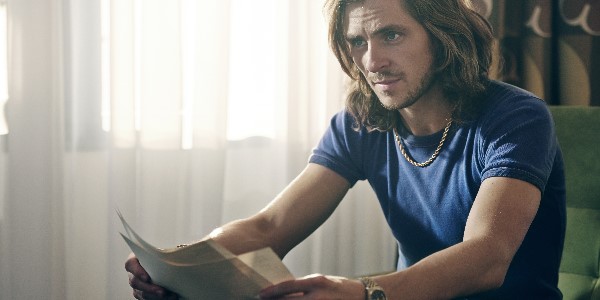The perfect rivalry. The baseline player versus the net rusher. The calm and collected versus the fiery and hot-tempered. The reigning champion competing for a fifth consecutive Wimbledon victory versus the rising star chasing his first title. Before tennis no. 1 Björn Borg and no. 2 John McEnroe even stepped foot on the pitch for the crackerjack final, there was a foundation for a movie in the makings. It’s the run-up to the 1980 Wimbledon Championship, and the match itself, that’s chronicled in the new biopic Borg McEnroe, that’s more Borg than McEnroe.
Sverrir Gundanson’s Borg takes the lead, 15-0.
It shouldn’t come too much as a surprise that there is this imbalance since it’s a Swedish production. In Sweden, it’s even simply and accurately titled ‘Borg’. Whatever expectations I had for Borg McEnroe as a character-driven biopic, well, they were successfully half met. The look at Borg’s life, who’s highly revered in his home country, is a worthwhile watch especially due to Sverrir Gudnason’s embodiment of him (the close physical resemblance helps). We see how his adolescent tennis-playing experiences and relationship with his coach Lennart Bergelin (the always reliable Stellan Skarsgård), the Salieri to Borg’s Mozart as Skarsgård has described, moulded Borg into the great player he was, and the humble, mild-mannered man he was when all eyes were on him.

It’s a role that requires subtlety and Gudnason brings the goods. His eyes are a window into Borg’s inner turbulence, the internal conflicts also expressed through subtle movements of the muscles of his face. Director Janus Metz realises these strengths in Gudnason’s abilities as an actor so the camera is often brought in very close to his face, a few times even shooting extreme close-ups on the eyes alone. The final shot of Borg McEnroe is a testament to his measured, meticulous performance.
LaBeouf is ace as McEnroe. 15-15.
LaBeouf is his equal in playing the opposite, bringing the fury to the court when reproducing McEnroe’s infamous behaviour, and channelling the intensity when he doesn’t have a racket in his hand too. Considering LaBeouf’s own infamous public antics and the revelatory extent of his method acting capabilities that he’s demonstrated in the last five years, he’s in his element here – the perfect actor to play John McEnroe. He lives up to those expectations with ease.
Where LaBeouf’s performance isn’t equal though is in scope of the examination of McEnroe’s life compared to Borg’s. There’s a ping-pong structure to the narrative but, as aforementioned, the ball stays for a longer time in Borg’s court. We even go beyond the court with Borg, delving into his grapple with fame in an oddly fascinating scene in a coffee shop in France, and his domestic life with fiancée and fellow tennis player Mariana Simionescu (Tuva Novotny). Scenes of his childhood are plentiful and fruitful in creating a full biographical account of the tennis legend.
Borg wins the next point. 30-15.
Conversely, virtually all of McEnroe’s scenes revolve around the Wimbledon championship. There are fewer scenes of his childhood and they don’t sufficiently establish the link between the boy and the man the same way the two timelines have a significant connection for Borg. The closest equivalent McEnroe has to a Lennart or Mariana is his doubles partner Peter Fleming (Scott Arthur). One of the highlights is a heated exchange between them about McEnroe’s behaviour and how it’ll affect his legacy.
It’s a shame McEnroe doesn’t get his fair share – all the cameras were on Borg and McEnroe at the time and, for Borg, Metz does a brilliant job taking us where the cameras couldn’t, but is less successful at delving into the psychology and philosophies that shaped McEnroe or what really influenced his irate behaviour. Nevertheless, LaBeouf’s mastery over the role, that, arguably, only he could play, makes all the McEnroe scenes entertaining to watch, even if they don’t enlighten us with fresh biographical details.
However, taking this into account, I would recommend the movie more to those who aren’t familiar with this historical sporting event or McEnroe and Borg’s rivalry because Metz keeps things accessible with such recreations of events familiar to those who are aware of McEnroe’s antics. As for helping understand the magnitude of this showdown, Metz fills audiences in straight from the start by opening Borg McEnroe with relevant information cards and the two players readying themselves on the court. The big match is about to take place and we hear commentators generate hype in various languages – you get it, the whole world is watching – before we’re thrown back to the inception of the tournament.
Borg McEnroe: Conclusion
Borg McEnroe is a movie that’s all about the performances. The performances that Gudnason and LaBeouf deliver make it hard to think any better actors could have taken on the legendary roles of Björn Borg and John McEnroe. Their complete committal to the roles makes it thrilling to watch them recreate the iconic Wimbledon final, even if, off the court, only one of them is given a complete assessment on how he became a legendary performer of the sport. Borg wins.
Do you think Borg McEnroe may have been greater if it was solely focused on one of them, like how Pawn Sacrifice focused exclusively on Bobby Fischer in the run-up to the 1972 World Chess Championship against world champion Boris Spassky? Tell us in the comments below!
Borg McEnroe was released in the UK on September 22, 2017, under the slightly altered title Borg vs McEnroe. For all international release dates, see here.
Does content like this matter to you?
Become a Member and support film journalism. Unlock access to all of Film Inquiry`s great articles. Join a community of like-minded readers who are passionate about cinema - get access to our private members Network, give back to independent filmmakers, and more.